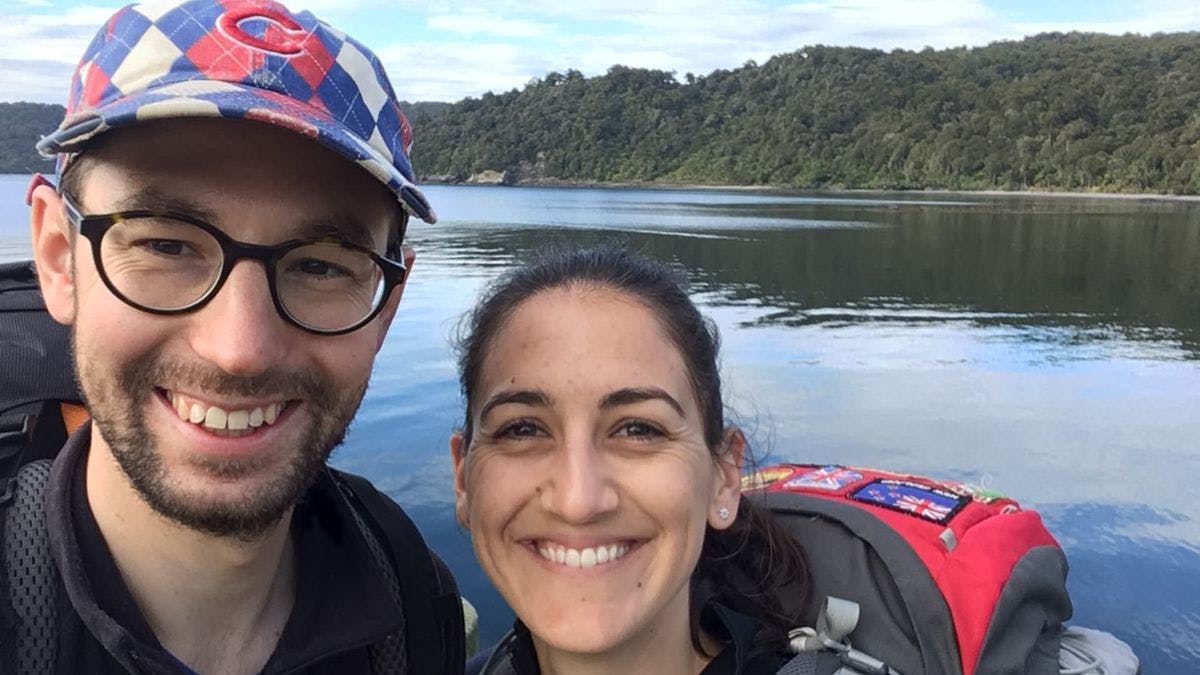29/09/2021
Barre Base Anywhere Members: Olivia Harrison

One of the most intelligent things about Otago University Neuroscientist Olivia Harrison is that she makes science accessible and digestible. Despite the complexity of her work, and the brainpower needed!, Olivia always has one goal – to empower people, and make them feel good.
I first met Olivia when I was 13. Olivia was visiting Dunedin from Christchurch to play Netball in my school's Sports tournament, and she ended up staying at our place as a billet. Olivia then moved to Dunedin the following year to start her studies at Otago University and stayed in touch with our family. Ever since she has been a huge part of our whānau.
I was hugely lucky to have Olivia tutor me throughout high school in maths and science – she really ignited a drive in me to succeed in these subjects. As a major lover of anatomy and bio-mechanics at high school, I got to read Olivia's university-level books, and pick her brains on topics that we were only scratching the surface on at school. I am so grateful to Liv for being such an incredible role model to me as a teenager.
Olivia moved back to Dunedin last year, and is now looking into the science of breath – which we all know is such a huge driving force and passion behind what we do at Barre Base.
So yet again, Olivia is leading the way and inspiring me with her passion and knowledge for science, and the ways in which society can benefit from its knowledge and power.
Whether it is with her AMAZING baking, thoughtful gestures, or by sharing her immense knowledge with others, Olivia puts her heart into everything.
I spoke to Olivia to give us insight into her studies, and what key points she wishes everybody knew about the power of breath.
I am so honoured to share this story.
Introduce yourself!
I’m Olivia Harrison (née Faull). I went to St Margaret’s College in Christchurch, then came to Otago to study a double degree in Neuroscience and Exercise Science.
How have your personal interests contributed to your research so far?
I’ve always been sports mad and did lots of rowing and netball at school (plus any other sport I could get my hands on), before moving to longer distance endurance sports such as multisport / coast to coast races and marathons. I was always really interested in the interactions between brain and body, and how these could contribute to not only high-performance sport situations, but also in the context of mental health. How can exercise make us feel better, or maybe even sometimes make us feel worse when we push really hard or go for extended periods of time?
Throughout my time as an athlete, I was always really interested in perceptions of breathing, as my breathing was something that I always noticed when exercising. Actually, not only noticed, but something I felt was one of my limiting factors to performance when I was exercising at my max. I just felt like I couldn’t get enough air in, and it was sometimes really scary!
While I don’t have asthma or any physiological conditions that might have contributed to these feelings, I’ve always been a pretty anxious person.
And while we all know that exercise is a really good way to help manage things like anxiety on a day-to-day basis (and helps me hugely), in the context of actually performing hard exercise I always wondered if it might be something that made these breathing perceptions scarier for me – lots of other athletes didn’t seem to be bothered by their breathing at all! So I wanted to learn a little bit more about this…
Tell us about your time at Oxford and then working overseas?
When I studied for my PhD at Oxford, I decided to focus on breathing perception and control, with a particular interest in whether athletes might be different in how they perceive their breathing. We came up with ways to test what was happening in people’s brains when we made it harder for them to breathe (like breathing through a really small drinking straw), or even when they were anticipating these breathing restrictions but they hadn’t actually started yet.
What we found is that some of the key fight/flight centres deep in our brain are activated when we experience these breathing stimuli, and even when we are only anticipating them.
In athletes, we found that their brain was more organised than sedentary people when they were anticipating these breathing stimuli – they were better at knowing what was coming and preparing for it, likely due to all of the exposure to body sensations they have as an athlete. This research was really interesting and I hugely enjoyed my time at Oxford (I even met my husband there and have since brought him home with me back to New Zealand), but I still had a few things on my bucket list:
- I wanted to live somewhere foreign that had an amazing environment for outdoor adventures and exercise, and
- I still wanted to see how these breathing perceptions were related to mental health.
So we settled on Switzerland (the mountains and the chocolate were the deciding factors!), and joined a psychiatry group so that I could focus on improving my understanding of conditions such as anxiety. We lived there for 2.5 years and had an amazing time – we learned a lot, skied a lot, and ate a LOT of cheese and chocolate. We learned a bit of German (which I now sometimes get muddled with as I start to learn more te reo Māori), and had a real experience in a completely different culture to the UK and New Zealand. And I got to dig a little deeper into those questions on body perceptions and anxiety…

If possible, can you give us a brief overview of your research so far?
Anxiety is one of the most prevalent mental health conditions, and we are seeing an even greater number of people suffer from more severe anxiety with the current worldwide pandemic.
You also don’t need to have an anxiety disorder diagnosis to know what it is like to be really worried about something, and how this can negatively impact your life.
While lots of really important work around anxiety considers the cause and thought processes that occur when someone is anxious, our research team focuses on how the symptoms of anxiety that end up in our body (like having a racing heart, sweaty palms, fast breathing…) can feed back and possibly start a negative spiral of emotions and create even more anxiety.
What we find is that people who have higher levels of anxiety have altered perceptions of their breathing compared to people with lower anxiety – they are actually less sensitive to changes in their breathing, they have reduced ‘insight’ into how well they are able to perceive their body, and they have altered brain activity when they are predicting what will happen to their breathing in the future.
These results, therefore, are just the beginning of our understanding as to how the communication between the brain and body can start to break down with anxiety, and we hope to use these to help improve treatments by giving people the tools to perceive their body better, and break the negative cycle of anxiety à symptoms à more anxiety.
Although you're only just getting started, what are the biggest takeaways so far?
This work we have done so far does not yet provide us with all the answers as to how we treat anxiety, but it is a starting point to understand how higher levels of anxiety can influence how well we are able to perceive our body.
And while we might believe that we are very ‘in-tune’ with our bodies, what we see is that anxiety can actually reduce our ability to sense changes in our breathing.
This is really important, because if we don’t realise when we are breathing faster or harder due to being worried, then we could more easily have further symptoms such as feeling light-headed. And if we don’t realise what is happening in our body, then these symptoms can make us feel even worse and worry us even further!
So even this knowledge might help to make a few things clearer; when we are anxious, we are likely ‘tuning out’ from body symptoms, even though we might not know it.
Also, our previous studies were conducted on healthy people with different levels of anxiety, so you don’t even have to have a clinical level of anxiety to see these differences in breathing perception. And while there are lots of treatments out there for anxiety (such as psychotherapy, anti-anxiety medication, mindfulness-based therapies, exercise etc.), we know that these treatments have varying degrees of success for each person.
Furthermore, while psychotherapy can have truly excellent results to help improve anxiety, these symptoms often return once treatment has finished.
What we are hoping to do with this line of research is understand how possibly treating the body symptoms of anxiety could help give people the tools to stop a worsening cycle of anxiety à symptoms à anxiety, and hopefully aid vital treatments such as psychotherapy for longer-lasting results.

What are you most excited to look into or discover?
We know that many types of medicine (particularly eastern medicine) has used breathing as a tool for improving mental health for centuries.
We know that things like yoga, meditation and exercise can help to calm us and reduce our worries, but we don’t yet know why or how these practices work.
We would like to see whether the reductions in anxiety are at least in part mediated by improvements in body perceptions (or ‘tuning in’ to our bodies), and whether we can help improve these mental health benefits – both by understanding their mechanisms and creating novel treatment strategies that build on these principles. So this is exactly what we are going to look into with the next studies we have planned!
My recent research was cross-sectional and can therefore only observe differences between people, and so we couldn’t ask any questions as to whether improving our breathing perceptions will help directly reduce anxiety.
Therefore, next, we are going to investigate whether treatments such as exercise or anti-anxiety medications may help people perceive their breathing more accurately, and whether this contributes to reductions in anxiety.
What are 5 key points you believe everyone should know about breath?
- Our breath is powerful. It is one of the access points into our inner body processes – changing our breathing can help alter our whole nervous system (our heart rate, our gut, our brain… everything).
- Don’t force it… For some people concentrating on their breathing really helps, while for other people they find it easier to distract themselves and not think about it. That’s why there are so many different breathing techniques and exercises out there – different things work for different people.
- Our breathing is tied to everything we do. There is even something called ‘email apnoea’ – when you stop breathing while you read your emails.
- Change takes time. Just like learning any new skill, trying to breathe differently is a process, and sometimes it can feel uncomfortable as we work through that in the beginning.
- The literal translation of the word ‘hauora’ (the Māori view of holistic health and wellbeing) is akin to ‘the breath of life’. Breathing is part of the fabric of our wellbeing.
On-demand barre, yoga & mobility classes.
© 2025 Barre Base · Terms · Privacy
Visit Barre Base